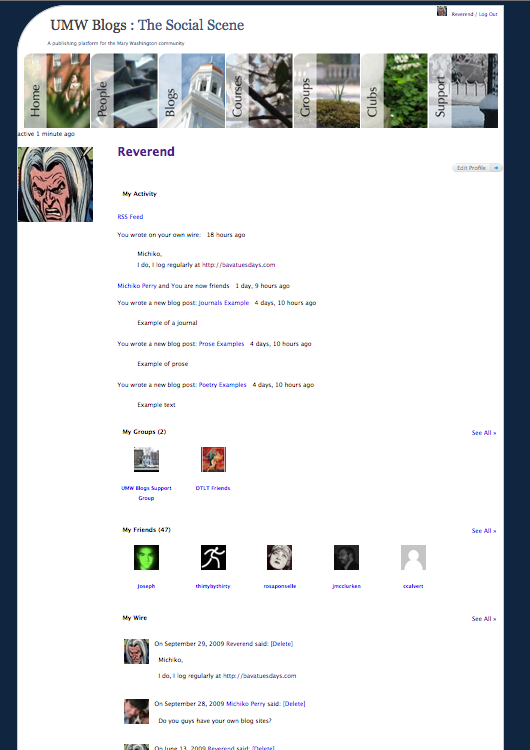…and oh what a beautiful thing it is. We made no special announcement, and we have kept the profile data to a bare minimum, and Martha just pulled the whole thing together with the awesome new theme (and who’s work shows no fear!). And I have to say I love the visual integration with BuddyPress, the entire space now works seamlessly and makes a huge difference. I’m interested to see if and how people find and discover one another through the blogs directory. When I just opened it up, I saw a number of cools blogs, our Strategic Planning site (another brilliant Martha Burtis design being stewarded beautifully by Nina Mikhalevsky out in the open), Tim O’Donnell’s and Jeff McClurken’s Ted Seminar is a featured blog, and Theresa Grana’s Bioinformatics syndicated Lab and Learning notebooks is front and center. It is another way at this community, and it opens up all kinds of possibilities for serendipity.
I find myself using the members directory to search known users and find new ones, I also use it as a kind of trace of who’s on now. And when I see an old friend, I friend them 🙂
The Groups directory is something I am thinking a lot more about. No one has used it really, but in the Looking for Whitman experiment, faculty are using it to direct message/email the entire class, and it works. It is also wold be interesting, as Martha pointed out, to experiment with a class forming a group, which immediuately spawns a blog that they can use to author, or simple work within the forum/wire of the group. What if groups had more of a twitter design for members, and allowed that conversations throughout the site in these unique groups, but then re-aggregated all together? Maybe, or maybe not. We’ll see.
Finally, the Profile page template is undergoing a much needed simplification, and it can be that very dashboard Gardner has talked about again and again, but something that show you your comments, blogs, friends, and various other things that allow you to frame an aggregated identity across the site.
Only time will tell, but I see the BuddyPress suite of features building in a rich means to explore the community that didn’t exist for WPMu before, and that in many ways brings some important sinews of connection between people into the architecture. Grafting that on top of thousands of blogs asn users opens up a space to see if and how people use it, and how might we be able to make it further illustrate the work that is going on throughout UMW Blogs.






Congrats on the bold move!
It is indeed wonderful thing.
We are looking into enabling it on UBC blogs, and will watch your steps closely!
I guess our setup is a bit more complicated with two WP servers for now, with potential of dedicated course server in the near future – we have to make them all talk to each other nicely.
Some of the new features in BuddyPress 1.1 are going to make it possible to really exploit the potential of groups (which I think is as powerful, or even more so, than the profile part of BP) with cool plugins like http://buddypress.org/forums/topic/buddypress-external-group-blogs-plugin. BP groups seem to me like a more logical choice for a syndication hub than a blog does, as they don’t have the kind of “am I a space for content production or aggregation” complex that blogs do. A working feedwordpressish plugin for BP groups – combined with powerful client-side filtering mechanisms that would allow group members and visitors to see just those parts of group feeds that are of interest to them – would make BP a killer app.
All I got is five words:
be.a.u.ti.ful.
And if I had two more:
stu.ning.
Novak,
I want to learn more about you multi-server setup. I am think a separate server for course blogs is a great idea. I assume you will be blogging this 🙂
@Boone,
I’m excited about groups as well, and I see the possibility with the groups to blog page, but as they stand now in BuddyPress, the group interface and interaction is rather weak. My other reason for sticking with blogs thus far is that the aggregation into blogs provides a more google-friendly mechanism for re-publishing and discovering content. How do BP groups rank in search engine crawling and the like? I love the idea of having people join course groups and then immediately getting a blog, but the groups have to start becoming far more sophisticated aggregation points, and I guess, as you are saying, that wouldn’t be too hard to imagine—and I can definitely see this as the next step for groups. So, like you, I am excited by them.
@Michael
4 words:
th.ank y.ou